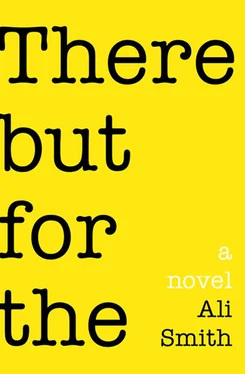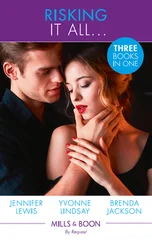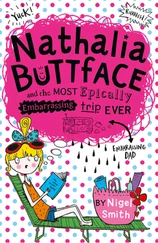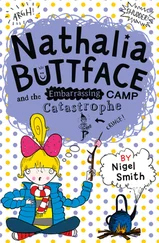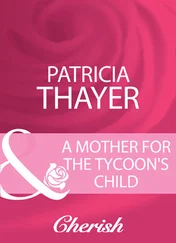She held it, sighted it, pulled the trigger.
The gun didn’t even kick. It was more a toy than a gun. But all the same the rabbit fell on its side, lay still on its side.
When she got her shoes back on and went out to look at it, it was still alive. She’d hit it in the fleshy part. Its furred back feet were neat one on top of the other. It lay in the soil of the flowerbed by the side of the lawn and it made no noise at all. It was as if it were dead. But when she looked down at it, it looked right back up at her, right at her with its brown eye in its head as if to say: well, you, you can just go and get lost.
You don’t have to worry, Mum, Eleanor had said. They’ve recarpeted, it’s the first thing I asked. They’ve actually recarpeted twice since the time of Mrs. Masters.
She meant well, Eleanor.
But May Young (who had stopped speaking out loud, and the blue of whose own eyes had iced over, the colour of them paler, behind a kind of frost on the day they’d told her, Harbour House when well enough, incontinent, probable onset of mild dementia, danger to self, the kind of looking-after that can’t be done at anyone’s actual home) thought to herself now that the leaving of life, when it came, might well be accompanied by a different seeing, maybe something akin to that rabbit’s seeing.
That’s what the babies did, after all, when they were born. They looked a look at the world as if they could see something that your own eyes couldn’t, or had forgotten how to. That’s what all three of them, Eleanor, Patrick, Jennifer, had done.
If the beginning was like that, chances were the end would be like that too.
Well, I’m in for it now, whatever it is.
Well, in for a penny, in for a pound.
Well, I wish, though, I really wish I hadn’t done that thing to that rabbit.
Out loud? No. That girl who was in the room, whoever she was, hadn’t moved. She didn’t even glance up from her phone she was looking at or whatever the thing they all have in their hands and press the buttons on was. That was them these days, spending all their time looking up things on the intimate. The great-grandchildren, even, and them hardly past babies, spent their time on the intimate. It was all the intimate, and answerphones and things you had to speak at rather than to. Nobody there.
Don’t just say nobody there all the time when you phone, Mum, Eleanor said one day. Say, hello, it’s me, then leave your message. It’s distressing for us, it’s distressing for the kids, it’s distressing pressing the answerphone message button and hearing you on there, I mean seven times yesterday, and each time saying nothing but the thing’s not working or nobody there. It’s creepy, Mum. And the thing is working. Leave a message, like a normal person.
I say nobody there because when I phone up there’s nobody there, May had said.
We are here, Eleanor said. We’re just choosing not to answer the phone.
This beggared belief. What were phones for?
Why would anybody have a phone and then choose not to answer it? May had said.
Touché. That got her. Touché Turtle away! That was a turtle that used to be on TV, a cartoon with a French hat on like a musketeer that they used to watch, and Jennifer used to wear her old Wrens cap and play at being the turtle in the garden.
It’s always Jennifer, was what Eleanor said once. She was angry. She was crying. This was years ago, ten years ago. May had made Eleanor cry by remembering something incorrectly. Eleanor was forty-five. She should have known better by then, a mother herself, with grown children herself, dear God and all the angels, than to have been standing crying at the sideboard about what got remembered and what got forgotten.
I know it was awful, Mum. I know how awful it was. But that time it was me. It wasn’t her, it was me. It was me you painted with the paintbrush and the calamine. Nothing ever bit her. It was me who was always bitten. You said it was because I tasted so sweet. That’s what you said at the time. Nothing ever bit her. It was always me who got bitten. I still get bitten. I still do. I’m still the one who gets bitten.
It was possible May had misremembered on purpose to annoy Eleanor. It was possible she knew exactly which child it had been, bare-backed, folded into herself like a paperclip on the little bed in the girls’ room with the bites coming up red all over her shoulderblades and the tops of her arms, flinching away from the cold of the lotion on the bristles of the painting-by-numbers paintbrush.
That girl there on the chair looked to be about the age of Jennifer. She looked about the age.
Jennifer’s dates: 4.4.63, 29.1.79.
They’d been watching an Alf Garnett film the night before on the TV. It had been quite a sad film for something supposed to be funny. Till Death Us Do Part. It was the film-length version of the TV programme. It was one of life’s cruel ironies, is what Philip had said after, that that’s what they’d been watching that night. January, taker of children into the ground. When she was two months shy of sixteen Jennifer’s heart had had a problem in it that nobody knew about.
Such elegant narrow feet, she’d had. Like her father’s feet. His feet, too, were narrow, that’s where she’d got it from. Philip had had unexpectedly girlish feet, pretty feet.
Well, feet in the end all went the same way, six feet down, ha, and that was life.
You had to count your blessings, Philip always said. He always said it when he was disappointed. It was how you knew he was disappointed.
Well, it was all right for him. At least he had the words for it. May had spent the years considering the sharpness and smallness and perfection of the fingernails on the hands, the toenails on the feet of every grandchild born, with a sadness she did not have words for.
(Jennifer comes into the kitchen. She is eight years old and very angry. She is holding a book she’s found in the pile of books on the table in the upstairs toilet. On the front it has a picture of a man on fire, his arms and legs stretched out inside what looks like a wheel of flames.
It is the most unfair thing I have ever heard of in not just the whole world, but the whole world and all the surrounding planets, Jennifer says.
She has been reading about people who burst into flames. The whole book is about people who suddenly burn to death there and then in their living rooms or wherever for no reason. Sometimes their legs and arms survive them and someone comes home and finds them in a pile on the carpet, nothing left of the main parts of their bodies but little heaps of ash.
Jennifer is near tears.
What if Rick was just playing football and kicking the ball and just as he was about to kick in a goal, just, out of nowhere—? Or Nor was doing modern dance like normal at the class on a Wednesday and then right in front of the big mirror, she—? What if Dad was fishing and he just, you know,—?
Well, then, the river would be the best place for him, May says. And it’s not often you’ll catch me saying that.
She puts down the iron and lifts Jennifer, who is clammy with anger, on to her knee on one of the kitchen stools.
But what if one day I came home from school, Jennifer is saying, and I went to make you a cup of tea, and then when I got through with the cup of tea, there was just a, a pile of ash on the chair, and there on the floor were your legs, and there on the arms of the chair were your arms?
Right. If this actually ever happens, May says, are you listening? These are my instructions. You are to just put the mug of tea in one of my hands there on the side of that chair regardless, have you got that? Because I’ll be wanting that tea.
Jennifer nearly laughs. She is almost persuaded. Then she goes limp again on May’s lap.
Читать дальше
